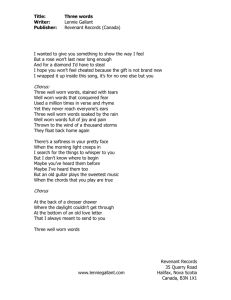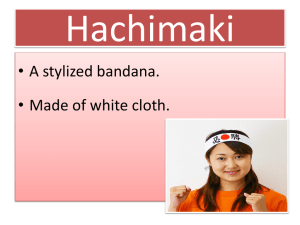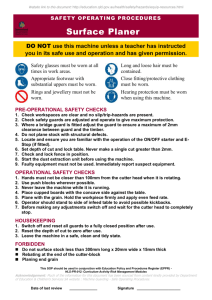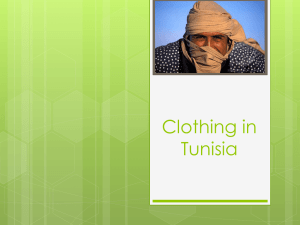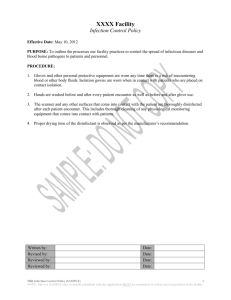General Safety Rules in Special Rooms_PSS
advertisement
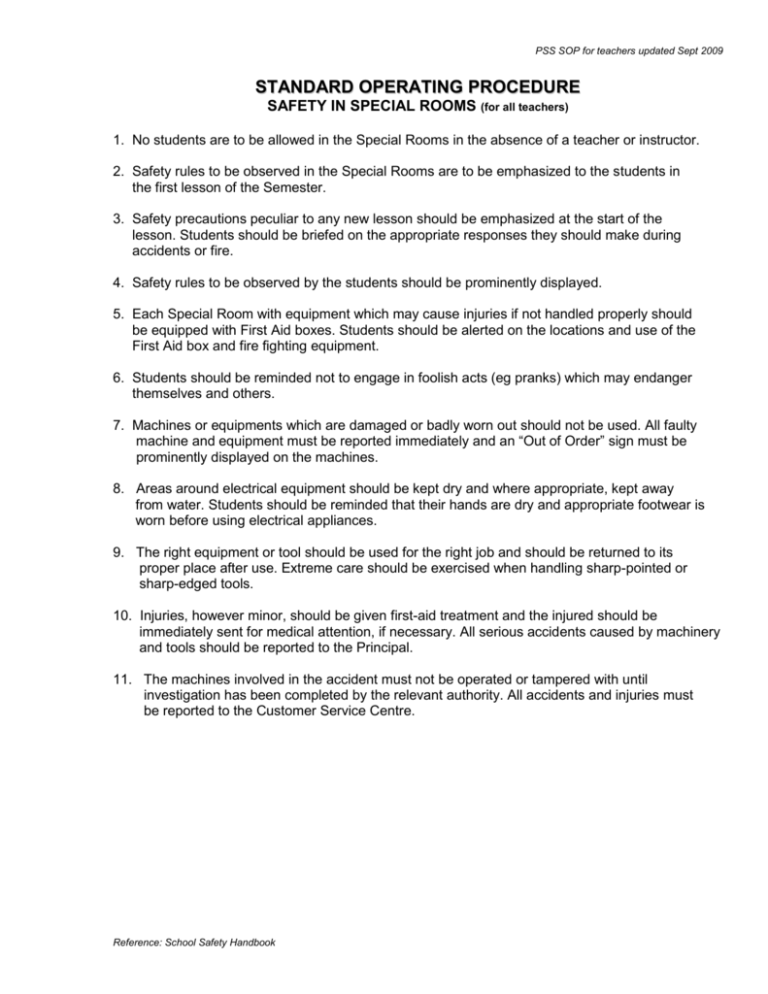
PSS SOP for teachers updated Sept 2009 STANDARD OPERATING PROCEDURE SAFETY IN SPECIAL ROOMS (for all teachers) 1. No students are to be allowed in the Special Rooms in the absence of a teacher or instructor. 2. Safety rules to be observed in the Special Rooms are to be emphasized to the students in the first lesson of the Semester. 3. Safety precautions peculiar to any new lesson should be emphasized at the start of the lesson. Students should be briefed on the appropriate responses they should make during accidents or fire. 4. Safety rules to be observed by the students should be prominently displayed. 5. Each Special Room with equipment which may cause injuries if not handled properly should be equipped with First Aid boxes. Students should be alerted on the locations and use of the First Aid box and fire fighting equipment. 6. Students should be reminded not to engage in foolish acts (eg pranks) which may endanger themselves and others. 7. Machines or equipments which are damaged or badly worn out should not be used. All faulty machine and equipment must be reported immediately and an “Out of Order” sign must be prominently displayed on the machines. 8. Areas around electrical equipment should be kept dry and where appropriate, kept away from water. Students should be reminded that their hands are dry and appropriate footwear is worn before using electrical appliances. 9. The right equipment or tool should be used for the right job and should be returned to its proper place after use. Extreme care should be exercised when handling sharp-pointed or sharp-edged tools. 10. Injuries, however minor, should be given first-aid treatment and the injured should be immediately sent for medical attention, if necessary. All serious accidents caused by machinery and tools should be reported to the Principal. 11. The machines involved in the accident must not be operated or tampered with until investigation has been completed by the relevant authority. All accidents and injuries must be reported to the Customer Service Centre. Reference: School Safety Handbook PSS SOP for teachers updated Sept 2009 SAFETY IN DESIGN & TECHNOLOGY WORKSHOPS 12. Refer students to the safety rules displayed in the workshops at the start of each lesson. 13. All machinery should have safety-guards and protective gears for users. 14. Tools that are blunt, badly worn, mushroomed or in poor condition should not be used. 15. Aprons or overalls should be worn during practical lessons. 16. Users should avoid wearing long-sleeved shirts, school ties, watches, rings, bracelets and bangles during practical lessons. Long hair should be tied up neatly. 17. The work area should be cleaned up after each practical lesson. Further details on D&T Safety Regulations are elaborated in the Design & Technology Safety Handbook located in all the D&T Workshops, the Technical Staff Room for teachers and the Library – D&T Teachers Resources. SAFETY IN HOME ECONOMICS KITCHENS 18. Refer students to the safety rules displayed in the kitchens at the start of each lesson. 19. Each new group of students should be instructed on the lighting of the gas burners, grill and oven. 20. When operating cookers: (a) All combustible materials eg paper towels, curtains, cloths, spray can should be kept away. (b) Windows and doors should be opened for ventilation while cooking or operating a gas appliance. (c) The cooker should not be left unattended when cooking. (d) The oven / grill door should be left slightly open when using the grill. (e) The cooker should be kept clean and in good working order. (f) Access to the gas control valve at the gas meter should be kept clear from obstruction. (g) All cookers and ovens must be properly switched off after lesson. 21. All students and teachers should wear an apron during practical food sessions. 21. Long hair should tied up neatly and nails should be kept short and clean. 22. Extreme care should be taken when using sharp-pointed / sharp-edged equipment / appliance and fragile glassware such as beakers and test tubes. 23. Safety goggles should be worn when conducting potentially dangerous food science experiments (eg smoke point of fats). Reference: School Safety Handbook PSS SOP for teachers updated Sept 2009 24. Chemicals should not be used when conducting food science experiments. 25. All appliances and equipment should be well maintained and serviced regularly. Further details on Safety Regulations in Home Economics Kitchens are elaborated in the Home Economics Handbook located in the Home Economics Staff Room and the Library – Home Econs Teachers Resources.. SAFETY IN SCIENCE LABORATORIES 25. Refer students to the safety rules displayed in the laboratories at the start of each lesson. 26. Laboratory storerooms and preparation rooms are out of bounds to all students 27. Long hair should be tied up neatly to avoid any interference with laboratory work. 28. Eating and drinking are prohibited in laboratories. 29. Students should seek clarification from the teacher if instructions for an experiment are not thoroughly understood. Students should not proceed with an experiment when in doubt. 30. Safety goggles must be worn whenever there is any risk of injury to the eyes. 31. Protective gloves and clothing must be worn when handling hazardous materials. 32. Hands must always be thoroughly washed before leaving the laboratory, regardless of whether gloves are worn. 33. Equipment used to handle or transfer hazardous materials must be inspected for leaks, cracks and other forms of damage before use. 34. Students are to report any damaged equipment, breakages, accidents and spillage to the teacher immediately. 35. Unlabelled chemicals should not be used. Students are to report unlabelled containers to the teacher. 36. Students should not take apparatus or chemicals out of the laboratory without the permission of the teacher. 37. Students are not to conduct any unauthorized experiments. 38. Pipetting should always be carried out using a pipette aid and never by the mouth. 39. Sharp objects (such as needles, razors or pins) should not be discarded in waste bins or trash bags. A sturdy container should be used for disposal of sharp objects. Further details on experiments and activities that involve specific procedures, equipment or materials (like chemicals or microorganisms) are elaborated in the School Science Laboratory Safety Regulations Handbook located in the Science Storeroom in each laboratory and the Library – Science Teachers Resources. Reference: School Safety Handbook
